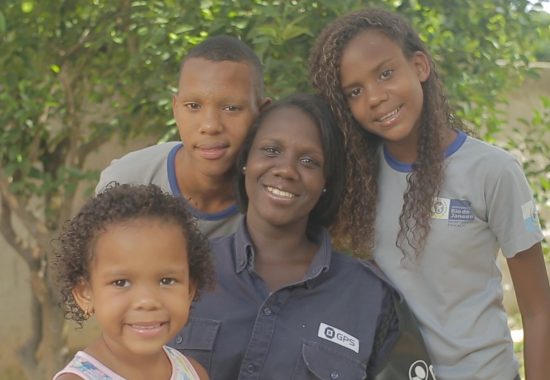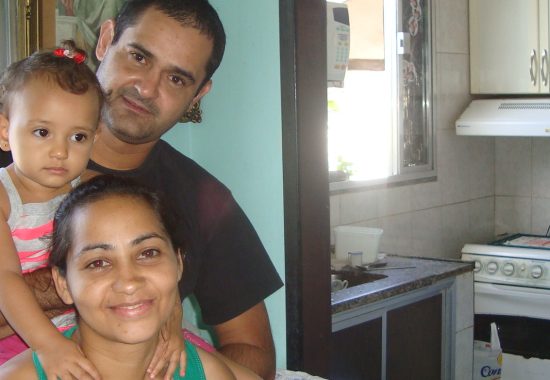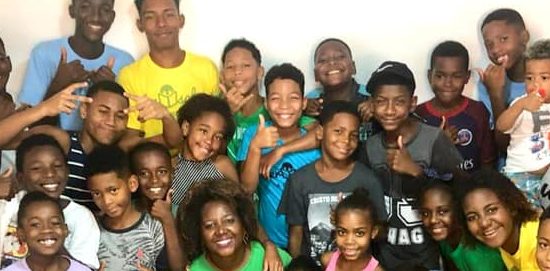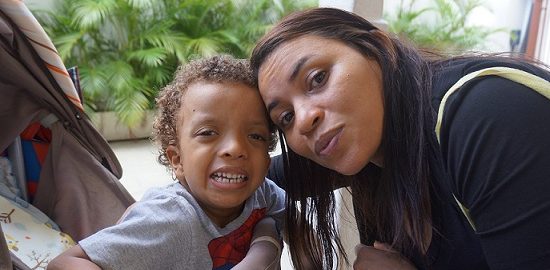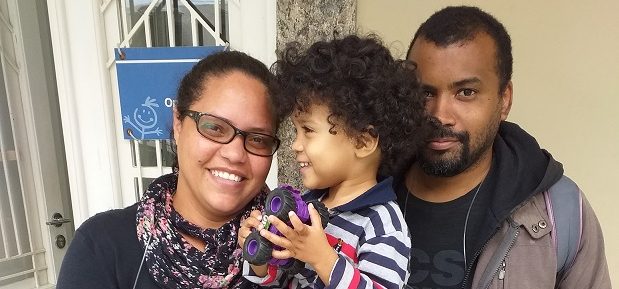

Priscilla’s Testimony
When I was discharged from Instituto Dara, I wanted to hug everyone there. And to shout to everyone there about how important their work is, how much it prevents people like me–who had no prospects at all and was about to be evicted with my children–from doing something stupid. When I rang the farewell bell, the floor of my entire apartment, which was peeling off and breaking, had just been all changed, which helped stop a sequence of allergic attacks and seizures of my son Nicolas. Shortly before I left, Dara had transformed my apartment. But it was just the last thing they did for me.
First, I need to tell you how they transformed my life.
Every mother imagines that she will get pregnant, have a healthy child, and get on with life. In my case, I had a high-risk pregnancy when I was expecting Nicolas, my youngest son. At the delivery, as soon as the baby came out of my belly, the pediatrician held him to clean him and told me that he had a congenital anomaly called hypospadias, a malformation in the urethra. When I left the maternity hospital, I was already given a document asking for a corrective surgery for my son. That is when my fight began.
And it was just the beginning. I had already quit my job in an accounting firm because of my high-risk pregnancy, then I had to spend all my time with him, looking for a surgery for Nicolas at a public hospital.
And I still had my daughter Helena to take care of. We lived in Santa Cruz, a neighborhood in the West part of Rio de Janeiro, and the only income we had was from Nicolas’ father, then a filling station attendant, my husband at the time. As the queues in the public health service SUS in Rio de Janeiro were quite long, Nicolas’ father and decided to move to Itatiaia, a small town in the mountains. We had relatives living there, and they said that SUS worked there much better than in Rio de Janeiro. We had the surgery done, but ironically in Rio, at the Lagoa Hospital. Ten months after we had left Rio de Janeiro, we moved back to Santa Cruz, my husband and I unemployed and with no money saved. We could not even afford hiring a moving truck.
The surgery went well, and I thought life would go back to normal. But three months later, at the revision appointment with the surgeon, she realized that there was something else wrong with Nicolas, a neurological problem, which had nothing to do with the hypospadias. Then I went into despair. She referred Nicolas to the neurologist, who discovered that he was autistic, and, because of it, he had several health problems. Over time, we discovered that he was also heavily allergic. Later, we were referred to several other physicians, and my pilgrimage with my son through Rio de Janeiro began for treatments in various specialties: speech therapy, physiotherapy, occupational therapy, psychopedagogy, psychology…
Therefore, I still cannot work – my life is all about taking him from doctor to doctor. It used to be much worse back then. As his father couldn’t get a job – he also went into a process of depression – we didn’t have anything to eat at home. But we managed to find a way to give our children what to eat, frequently I did not eat anything so they could have a meal. The only solution I found was to ask for help on the streets. I would go to food trucks, snack bars, and had the meals on the cuff. As I have always worked, having to beg for money on the streets shook me up a lot. I felt ashamed and guilty, as well.
I started to go into a deep depression, getting isolated from friends and family, I couldn’t stand this situation anymore. I’d rather ask strangers on the streets than my acquaintances.
These memories are still quite painful to me. I often went out with Nicolas on my lap with no money for the return ticket. I had to find a way to ask someone for it, or to sell something on the train, on buses.
And there was the issue about our house. We had unpaid rents; the landlady was about to evict us. Nicolas’s medicine cost about R$600 a month, so whatever money we earned we had to choose between our house or Nicolas’s health. What about the tickets? What about the food? I began to think that there was no solution to this, that my children would be much better off without me, that it was all my fault for our situation, that I didn’t try hard enough, that I had done something wrong during my pregnancy. These thoughts surrounded me. In those moments, our head is our worst enemy.
The last day at rock bottom started at 4:30 in the morning, when I woke up to take Nicolas to another appointment at Hospital da Lagoa. He didn’t want the breast anymore and was very agitated, aggressive, willing to eat something. Not only did I have nothing to give him, but I also hadn’t eaten anything myself. We were both hungry. When we arrived at the hospital, a nurse who already knew us asked what was happening to him. I vented; I told her everything. She was very sympathetic, gave us something to eat – thank God it was a biscuit with no traces of lactose, because among the many severe allergies he had was that of milk protein, a reaction called CMPA – and asked the doctor to refer us to Instituto Dara. I also told the doctor our story, and she gave us the paper for the referral. We went there the next day because it turned out to be late.
It was in July 2019, and I’ll never forget it. Nicolas was 2 1/2 years old but weighed just 11 kilograms. I had already gotten help from other places, so I was not too optimistic. I thought I would be given another staple food basket, never to be looked for again. It was all completely different. To this day I remember the way the social worker looked at me, with compassion, and I clearly remember the hug she gave me.
She really wanted to hear what I was saying, she understood my pain. On the same day, we went home with donated special milk, paid bus tickets, and they took Nicolas’ prescriptions and paid for all the medicines. We just stood there and waited for the drugs; I could hardly believe it. And we even got an R$ 80 card to buy food at the market. I can’t even put into words how much it filled me with hope again.
That day, I came back home with tears in my eyes all the way through, I could hardly believe what was happening. It was magical.
We stayed almost three years at Instituto Dara, since they extended our presence because of the Covid-19 pandemic – other families were struck by Covid, as well. In the meantime, I split up and went to live in an apartment with my kids, working from home doing printouts, tax returns, that sort of thing. One of the main aids I had was Dara’s legal and social assistance support to get my son’s benefit, the Continuous Payment Benefit (BPC), a monthly minimum wage that the government gives to people with disabilities who are unable to support themselves. But the benefit took almost a year. This is worth mentioning because the benefit not only was paid, but paid in full, and I used this money as a down payment for the apartment where we lived. The owner of the apartment took my offer, and I started paying for my mortgage, not for rental fees anymore.
I thought this would be Dara’s last transformation in our lives, but in October of last year the floor in my living room began to peel off and release dust a few months after I made the down payment. The flooring would just crackle and peel off the floor. It was a ‘Minha Casa, Minha Vida’ building, a popular housing program in Brazil, and the mortar used was not of good quality. And there was no point in cleaning it or getting it wet. It got worse because it took off even faster from the ground. The same thing spread from the living room to my bedroom, then to the bathroom… The whole house looked like this. As Nicolas was very allergic, he began to have severe asthma attacks, which ended up causing seizures called absence seizures. He had already had these seizures, but they became very frequent. He even had three seizures in a single week. It was desperate. He lay motionless on the ground, like frozen; it looked as if he had died. He was already using two asthma inhalers and a bottle of anti-allergy medication weekly, and nothing worked. I thought I would have to move out of our apartment, and that I would need to have him hospitalized to avoid the worst.
Then Dara’s Housing area ended up coming to our aid before we had completed our journey at the Institute. My life was much better, but I still wouldn’t be able to do a renovation that size. In January 2022 we had a conversation and in February Dara went to my place to have a clear picture of the situation. The renovation started and ended in April! And the process was amazing. They asked me to get three quotes from home improvement stores and three quotes from bricklayers. It was nice because I was able to choose trusted people to come into the apartment and do the renovation. This meant a lot to me, since I lived with Helena and Nicolas. And I was able to choose the flooring – they did not impose anything based on the price. It was all done with a lot of common sense and care. The works took three weeks to be completed, and today Nicholas no longer has asthma attacks and, as a result, no more seizures. It improved his health so much.
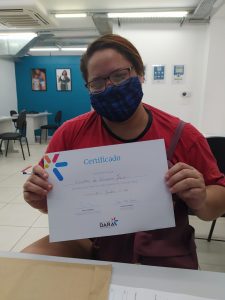 I could spend a full day talking about how Instituto Dara has changed my life. The Nutrition area was especially important in Nicolas’ food readjustment because of the CMPA diagnosis and food selectivity, which is quite common in autistic people. But I would also like to mention the Psychology area. As soon as I joined Dara, I was given a list of phone numbers and the instruction that I could call collect whenever I needed to. Soon after the screening, I started talking to the psychologist. Like I said, I was having bad thoughts when I entered Dara, and I despaired. Until things got better, I talked about giving it all up. And the psychologist would help me; she would spend almost an hour on the phone with me, trying to dispel those thoughts. She was always a sweetheart; she gave me the attention I never expected to get. It went far beyond what a psychologist could do, and I was really trying to understand everything that was happening to me. Soon after the renovations on my apartment, I completed my journey at Dara to make room for another needy family, who needed the same affection that saved my family. But even after leaving Dara, we are never forgotten. It’s like a new family that you take with you forever.
I could spend a full day talking about how Instituto Dara has changed my life. The Nutrition area was especially important in Nicolas’ food readjustment because of the CMPA diagnosis and food selectivity, which is quite common in autistic people. But I would also like to mention the Psychology area. As soon as I joined Dara, I was given a list of phone numbers and the instruction that I could call collect whenever I needed to. Soon after the screening, I started talking to the psychologist. Like I said, I was having bad thoughts when I entered Dara, and I despaired. Until things got better, I talked about giving it all up. And the psychologist would help me; she would spend almost an hour on the phone with me, trying to dispel those thoughts. She was always a sweetheart; she gave me the attention I never expected to get. It went far beyond what a psychologist could do, and I was really trying to understand everything that was happening to me. Soon after the renovations on my apartment, I completed my journey at Dara to make room for another needy family, who needed the same affection that saved my family. But even after leaving Dara, we are never forgotten. It’s like a new family that you take with you forever.
I will be forever grateful for everything you have done for me.
